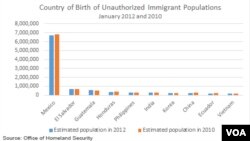In the concrete block-walled visiting room of the Stewart Detention Center in Lumpkin, Georgia - one of the biggest immigrant holding facilities in the country - Salvadoran-born Nilson Flores says he’s seen many detainees sent back to countries where their lives are in danger.
“They should call this place the 'jail of broken dreams',” he said.
Beatriz Henao, a Spanish-speaking volunteer from a faith-based group, speaks to him through an intercom, separated by a bullet-proof glass window. She smiles and tries to lift his spirits a little, urging him to have faith.
“Dios nunca llega tarde,” she says. “God never arrives late.”
Flores is one of around 34,000 immigrants in detention at facilities across the country, while Henao belongs to a group of volunteers that pays weekend visits to the Stewart Detention Center, even though many of them oppose what they describe as mass incarceration of immigrants and want it shut down.
The group is known as El Refugio - which means ‘the Refuge’ in Spanish. Every weekend the volunteers, mainly from the Atlanta area, drive about 225 kilometers to Lumpkin and work out of a pastel-yellow clapboard house down the road from the detention center.
Lumpkin is in one of the poorest counties in Georgia. There are no hotels in town, and few shops. El Refugio was set up in 2010 by a group of Christians initially as a place to stay for families who had to travel great distances to see detained relatives.
Now volunteers call on detainees, including many who don’t have family in the United States. So far this year they have conducted more than 300 visits. They also bring bags of donated clothing and other articles.
“It is not as intimidating as it used to be,” volunteer leader Marilyn McGinnis said as she drove toward the high concertina wire fences and security cameras that surround the detention center. “But I have to remember that for new people it’s a place that’s designed to instill fear.”
Stewart Detention Center, which holds around 1,700 men, is run by Corrections Corporation of America, a private company that also operates prisons. CCA says on its website that it works to uphold detainees’ internationally-guaranteed human rights and that all its facilities ensure, “an appropriate standard of living for everyone in our care.”
But McGinnis says there’s a lot left to be desired. “I think when your profit margin is dependent on apprehending and incarcerating people and when you make more profit by cutting costs in their care, I feel that that’s reprehensible.”
The U.S. Immigration and Customs Enforcement agency says taxpayer money is saved by using private contractors like CCA who, according to a written statement by ICE spokesman Vincent Picard, are “audited regularly by both government and outside inspectors to ensure they are maintaining proper standards and correcting any discrepancies noted.”
The Stewart facility is the site of an annual protest, that calls for it to be shut down. The American Civil Liberties Union says conditions at Stewart are often inadequate. Last June, detainees rioted after a report of maggots in the food.
Picard said the report was investigated and no evidence of maggots was found. In his statement, he said the disturbance was incited by a detainee who “has criminal convictions for starting a fire at his country’s embassy and for physically assaulting his nation’s ambassador to the United States.”
“We work continuously with CCA and our ICE detainees to address areas of concern, such as food quality,” Picard said.
Some of the volunteers worry that the services they provide - bringing bags and clothing, providing spiritual counseling and moral support, and housing detainees' visiting families - have the unintended consequence of making CCA’s job easier, and thus boosting the company's bottom line.
Marie Marquardt, another El Refugio volunteer, says the group's larger aim is bringing Americans into contact with detained immigrants.
“We believe the overwhelming majority of people who are in detention right now, don’t need to be detained,” said Marquardt, who is also a professor at the Candler School of Theology at Emory University.
She says immigrants are detained not just at the border, but also after having lived for years in the United States. Some are taken into custody for minor infractions like driving without a license. (Undocumented immigrants cannot obtain a driver's license in most states.)
“These are not hardened criminals, they don’t pose a threat to our community, and there’s evidence that programs that offer alternatives to detention, programs that allow them to await their court date outside of a detention facility have great rates - people are showing up for their court date.”
And she says many Americans don’t realize that many immigrants already have family here. Like Nilson Flores who just wanted to join his parents. They left him as a baby with relatives when they fled the Salvadoran Civil War in 1990.
After saying a prayer with him through the thick glass of the visiting room window, the volunteer bids farewell, not sure if she will ever see him again.






